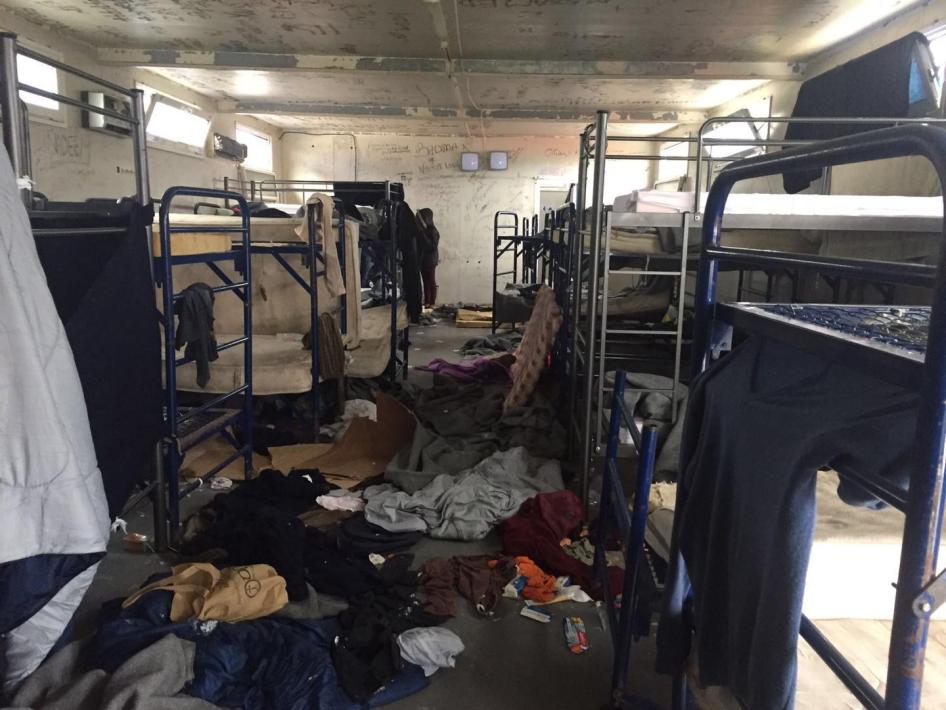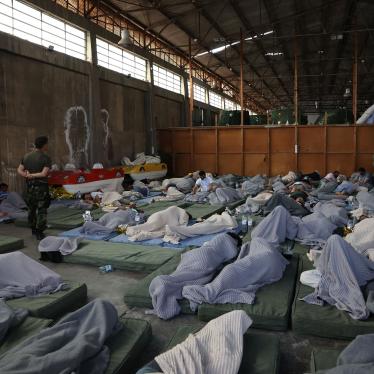(Brussels) — Barack Obama, on his final visit to Europe as US president, should call on EU leaders to defend universal human rights and show greater responsibility for refugees, Human Rights Watch said today. Obama is scheduled to visit Greece on November 15 and 16, 2016, and Germany on November 17 and 18.
“As part of cementing his legacy, Obama should deliver a clarion call for EU leadership in the global displacement crisis,” said Judith Sunderland, associate Europe and Central Asia director at Human Rights Watch. “On the heels of the divisive US elections, President Obama should speak directly about respecting the rights of migrants and asylum seekers already in Europe and increasing refugee resettlement in the EU, the US, and beyond.”
Instead of stepping up resettlement, the EU has focused on policies designed to outsource responsibility for asylum seekers and refugees, Human Rights Watch said. Today, Human Rights Watch issued a question-and-answer document on the EU’s deal with Turkey to accept the return of asylum seekers, detailing its flaws and the abuses it has entailed.
Mismanagement and lack of coordination among EU governments contributed to a political and humanitarian crisis in 2015, when over one million asylum seekers, migrants, and refugees reached Europe by sea. While arrivals have been much lower in 2016 – under 340,000 – significant challenges persist, with front-line EU countries shouldering the lion’s share of responsibility. More than 4,200 have died or been reported missing at sea so far in 2016, the deadliest year on record.
Greece received 850,000 asylum seekers in 2015, and remains the epicenter of the crisis. And Germany is a preferred destination for many migrants and asylum seekers. In both countries, Obama will see the impact of the EU’s failure to take humane collective action and enforce common standards to protect refugees, Human Rights Watch said.
The situation in Greece is particularly alarming, with an estimated 60,000 people stranded in poor conditions due to border closures to the north and poor implementation of a plan to relocate tens of thousands of asylum seekers to other EU countries. Reunification with family members elsewhere in Europe remains elusive for many. As winter approaches, efforts are under way to winterize some of the over 40 camps across the country, but families in many of the largest and worst camps risk living through the winter in unheated tents in muddy, windy sites.
Unaccompanied children face detention in overcrowded, unhygienic cells, sometimes with unrelated adults, while they await placement in the insufficient, overwhelmed shelter system. Children, whether alone or with their families, also endure unsafe and inappropriate conditions in camps throughout the country.
“Obama should urge the Greek government to end the unjustified detention of lone children and make sure that all children have safe, adequate accommodation and the services and care they need,” Sunderland said. “But he also should send a strong message to other EU countries that they should speed up family reunification and relocation.”
Building on his leadership at the UN and US refugee summits in September, Obama should use his visit and remaining time in office to press EU countries to dramatically increase resettlement of refugees from outside the bloc, Human Rights Watch said. Despite some efforts since 2015, and recent pledges, the EU has largely failed to overcome its poor record in providing resettlement places commensurate with its capacity and the overwhelming need. UNHCR, the United Nations refugee agency, estimated that more than 1.1 million refugees needed resettlement in 2016. Only 18 out of 28 EU countries participated in the summit convened by President Obama in September to secure pledges to double the number of refugees resettled worldwide.
While the resettlement during 2016 of 12,500 Syrian refugees to the US was politically divisive and far short of responding to the need, the United States is a leading resettlement country. The US has resettled 85,000 refugees in 2016, and the Obama administration pledged to take in 110,000 next year. The Trump administration should agree to uphold that pledge and to cease its use of divisive, anti-immigrant language. The US Congress should ensure there are enough funds to meet this commitment.
For the EU, its deal with Turkey, which already hosts nearly 3 million Syrian refugees, to accept the return of all asylum seekers who reached the Greek islands from there in exchange for aid and political concessions, reflects the EU’s efforts to outsource its responsibility for refugees.
The deal has not worked according to plan and may collapse under legal challenges and fragile negotiations with Turkey. It has, however, set a dangerous precedent by putting at risk the very principle of the right to seek refuge. It has created a dangerous model that the EU is seeking to replicate with other transit countries, and has contributed to severe overcrowding in substandard and unsafe detention centers and camps on the Greek islands.
In Germany, Obama will meet with Chancellor Angela Merkel as well as the leaders of France, Italy, and the United Kingdom.
“In these uncertain times, leadership grounded in respect for universal human rights, human dignity, and shared responsibility for people in need is all the more vital,” Sunderland said. “EU leaders should seize the occasion of Obama’s visit to collectively reaffirm these values.”









